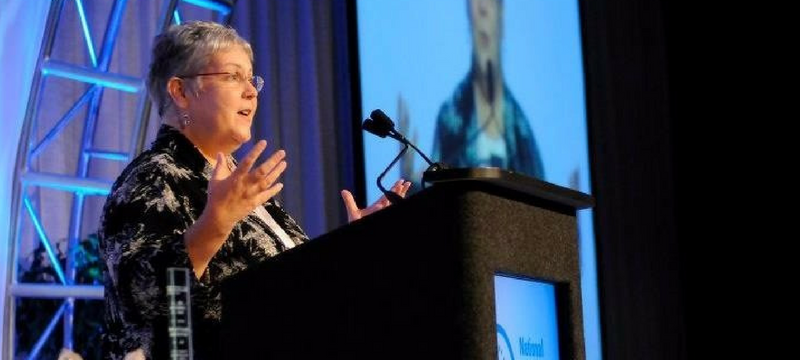With more than 40 years in the field of nursing, Susan E. Reinarz, DNP, APRN, NNP-BC, was recognized with the 2016 Neonatal Nurse Practitioner Excellence Award. This award is given by the National Association of Neonatal Nurses (NANN) for outstanding contributions in neonatal nursing through exemplary practice, leadership, service and education.
“I’m not into awards,” Reinarz said, but this excellence award is an honor to her “because it comes from my peers and colleagues.” She was nominated by “phenomenal people that I look up to.”
Her pursuit of neonatal nursing actually happened by chance. “I didn’t choose [neonatal nursing], it chose me,” she said. Reinarz’s career began in 1974 when NICUs were still a new concept. Though she had spent time working in emergency care during school, “babies had never occurred to me.” It was the “intellectual stimulation, the challenge of the ER and the opportunity to be with families” that set her course on neonatal nursing. “I was hooked from the first day,” she said.
An opportunity to grow
Reinarz came to MEDNAX in 2001 as a neonatal nurse practitioner with Pediatrix Medical Group in Fort Worth, Texas. She worked in a large neonatal practice, providing specialized care for procedures such as high-risk deliveries and neonatal resuscitation. She also assisted with staff training and served on committees for staff communication and clinical improvement. Reinarz had moved many times in her adult life, including Kansas, Georgia and Nebraska—often due to her husband’s work as a minister. When she arrived in Texas, “I wanted to work with the same organization,” she said. MEDNAX gave her that.
In 2013, she was offered the opportunity to take on a new role with the company. Reinarz joined the Center for Research, Education, Quality and Safety (CREQS) as Associate Nursing Educator. While she still spends some hours providing clinical care in Texas, most of her time is focused on education. Although the CREQS is headquartered in Florida, the nature of her position allows her to remain in Texas or on-site as duty calls. She helps develop educational programs for professional practice, clinical competence and career development.
Both an educator and a student
Reinarz is not new to teaching. In addition to supporting students and residents during practice training, she has served as a mentor, instructor and adjunct faculty member in higher education. When asked why she is drawn to education, Reinarz said, “I was the lucky recipient of bedside education from physician mentors and nurse mentors. My favorite way to share knowledge is through those teachable moments.” She sees her current work as formalizing the process.
Through the CREQS, she is able to exhibit at events, travel to hospital programs large and small, and meet people in practice who not only learn from her, but teach her as well. She says face-to-face engagement offers some of best understanding of gaps in educational needs. She believes the greatest advancements in neonatology are not the technology or ethics improvements—those are immeasurable, but secondary when compared to the “growth in research and quality,” she said, “which lead to a better understanding of what we do” and how to do it better.
Always a caregiver
Reinarz has no plans of stopping her work anytime soon, but in her precious spare time, her creative outlet is sewing—specifically quilting. “Of all the quilts I’ve made, I only own one—and it’s small,” she said. The rest have been given as gifts or donated as March of Dimes auction items. She is a volunteer stitcher as well, making pillowcases and burp clothes for children in the care of her local hospital. She is also active in her church, health and welfare organizations, and animal rescue. “We are a family of rescue dogs,” she said, with seven adopted canines split among her and her husband, and children and grandchildren.
Reinarz earned her bachelor’s and master’s degrees in nursing from the University of Nebraska and doctorate of nursing practice degree at the Medical University of South Carolina. Her work has appeared in the Advances in Neonatal Care and Neonatal Network, and she has mentored other authors in the writing and publication process. She has a special interest in the application of simulation, or as she calls it, “learning how we learn.”
